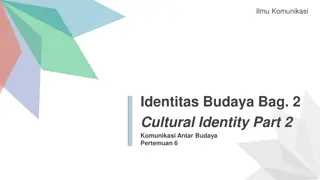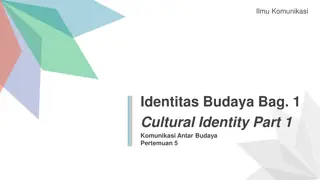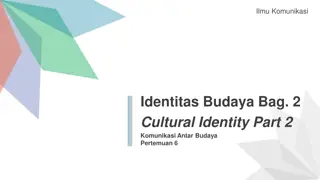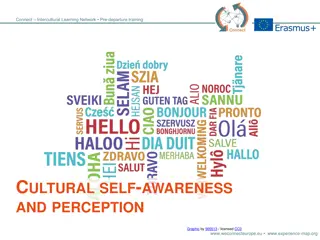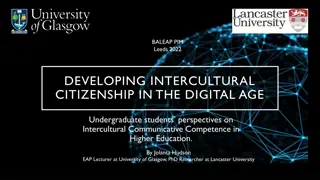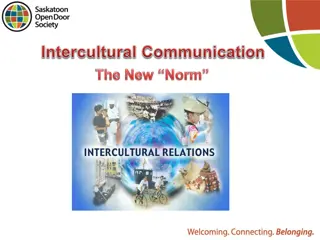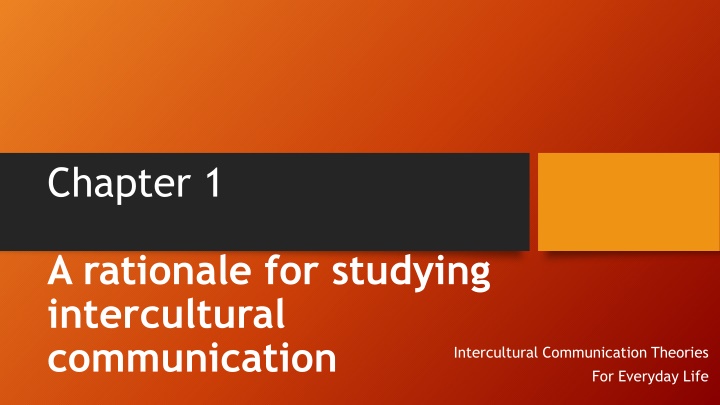
Rationale for Intercultural Communication Studies
Terms like culture, communication, and intercultural communication are explained in this chapter, along with the motives behind studying this field such as personal growth, social responsibility, economic reasons, cross-cultural travel, and the influence of media. The text delves into the significance of understanding intercultural communication for personal development, global issues, economic shifts, travel experiences, and media consumption. It also mentions the challenges of oversimplifying other cultures when studying intercultural communication.
Download Presentation

Please find below an Image/Link to download the presentation.
The content on the website is provided AS IS for your information and personal use only. It may not be sold, licensed, or shared on other websites without obtaining consent from the author. If you encounter any issues during the download, it is possible that the publisher has removed the file from their server.
You are allowed to download the files provided on this website for personal or commercial use, subject to the condition that they are used lawfully. All files are the property of their respective owners.
The content on the website is provided AS IS for your information and personal use only. It may not be sold, licensed, or shared on other websites without obtaining consent from the author.
E N D
Presentation Transcript
Chapter 1 A rationale for studying intercultural communication Intercultural Communication Theories For Everyday Life
First, some terms: Culture: The way of life of a group of people Communication: The process of creating and sending symbolic behavior and the interpretation of behavior between people Intercultural communication: When culture impacts the communication between two or more people enough to make a difference International communication: Communication through media and media systems in different cultures
Building a rationale: Why do we need to know about intercultural communication?
The personal growth motive Knowing about intercultural communication (IC): helps us understand the world better makes us more aware of ourselves and our own culture makes us more flexible as individuals
The social responsibility motive We have responsibility to live peaceably and ethically with others Global issues require combined social action: environmental issues poverty and income inequality armed conflicts
The economic motive An increased international economy (e.g., multinational corporations) A shift in economic power from developed to developing nations
The cross-cultural travel motive Tourism International student travel Refugees and asylum seekers
The media motive We are producers and consumers of global media Many media corporations and conglomerates cross international borders Product consumption and advertising is international Social media, Internet gaming, and video-sharing sites extend our intercultural connections
Challenges of studying intercultural communication The danger of oversimplifying other cultures: treating cultures as unchanging or overly homogeneous The danger of overgeneralizing: thinking specific individuals will be exactly like their cultures The tendency to exaggerate differences: forgetting to see how similar we are in many ways to people from other cultures
The history and focus of intercultural communication (1) 1940s-1950s: E.T. Hall and the Foreign Service Institute: The discipline began at the service of state interests The discipline began very pragmatically: looking for what works for foreign diplomats A change in focus from a broad view of culture to communication
The history and focus of intercultural communication (2) 1960s: A decade of little research as IC sought a home 1970s: Growth of IC research 1980s: Development of IC theory 1990s: Controversy and new directions in ethnography, non-Western theory, critical theory



